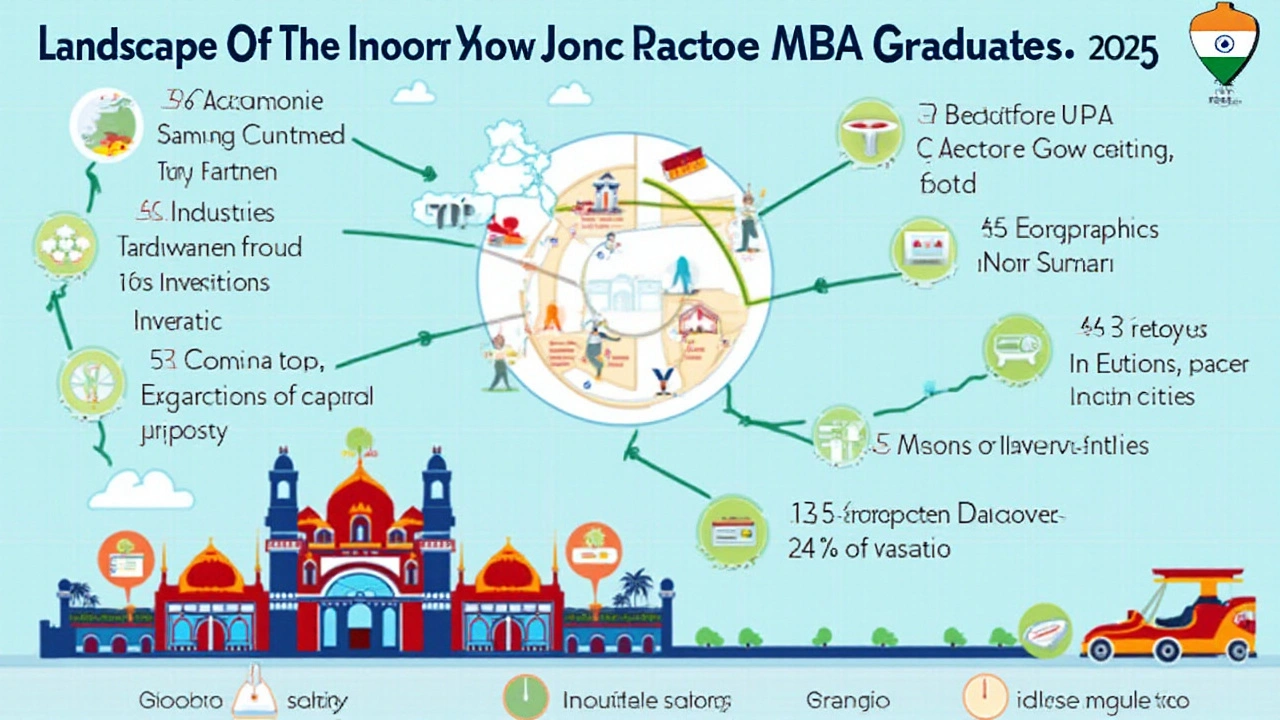Embarking on a journey with an MBA degree brings not just an enriched treasury of knowledge, but also the promising potential for a splendid career path. Yet, with so many factors influencing the income landscape, figuring out a realistic post-MBA salary can be quite a puzzle.
Graduates in 2025 find themselves in a dynamic job market, where salary packages are shaped by a multitude of elements. Whether it’s the industry they choose to dive into, the geographic location they decide to settle in, or the skillset they offer, each plays a pivotal role in determining their earning power.
In this article, we’ll take you through the nuances of current salary trends, dive into potential earnings across different sectors, and offer sage advice on how to position yourself for negotiation success. These insights are designed not just to inform, but to empower, as you take your next steps into the world of MBA-earned opportunities.
- Current MBA Salary Trends
- Industry Variations in Salary
- Impact of Location on Earnings
- Negotiation Strategies for Higher Pay
- Skills That Influence Salary Offers
- Long-Term Career Earnings Potential
Current MBA Salary Trends
As we find ourselves in 2025, one can't help but notice the evolving landscape of MBA salaries. It’s a fascinating confluence of aspirations, skills, and market dynamics. Graduates who once viewed the possibilities of post-MBA earnings as a monolithic pursuit are now navigating a landscape as varied and intricate as the fields they enter. For many, the importance of understanding these salary trends lies not just in dreaming big, but in planning wisely for their future.
The numbers tell much of the story. According to the latest data from the Graduate Management Admission Council (GMAC), the average base salary for MBA graduates has risen steadily, reflecting shifts in demand across sectors. Fresh MBA holders can anticipate salaries ranging from £70,000 to £120,000 annually, with variations depending largely on the industry and geographic location. With sectors like technology and healthcare often pushing the higher end of the spectrum, the prospects appear robust. Interestingly, consulting firms also continue to offer competitive packages, especially for those bringing a rich tapestry of experience to the table.
Diving deeper, we notice that high-tech industries have not only sustained but expanded their appetite for MBA talent. Companies are willing to reward individuals handsomely for the strategic thinking and problem-solving skills that MBAs provide. Graduate salaries in tech roles, particularly in metros like London, can comfortably reach upwards of £100,000, reflecting both the scarcity and the value of such skills. It’s a landscape where specialization and adaptability become currency.
"The MBA remains a potent combination of skills and ambition," remarked Sarah Robson, Dean of the Manchester Business School. "In today’s world, companies are seeking leaders who not only adapt but thrive in digital economies."
As more graduates embark on their post-MBA careers, there is an intriguing element of mobility. Many are willing to relocate for the right opportunity, influenced by global connectivity and the lure of emerging markets. Locations previously overlooked are now gaining popularity, offering unique benefits and lifestyle choices in tandem with solid salary packages.
Lastly, it’s significant to spotlight another trend: the entrepreneurial path. An increasing number of MBA graduates are eschewing traditional routes in favor of starting their ventures, driven by both passion and the potential for lucrative payoffs. While such paths may initially diverge from conventional salary reports, the success stories add an exciting dimension to the mosaic of MBA career outcomes. In sum, the financial promise of these diverse avenues is as enticing as it is complex.
Industry Variations in Salary
The salary of an MBA graduate often becomes a reflection of the industry they dive into directly after the program. Different sectors value distinct skills and specializations, leading to a diverse spectrum of compensation packages. For instance, those venturing into the finance and consulting industries often find themselves in the upper echelon of the pay scale. This is attributed to the high-pressure environment and the critical role these professionals play in strategic business decisions.
In contrast, graduates entering the nonprofit or education sectors may experience more modest starting offers. However, these professions often provide non-monetary rewards that appeal to those motivated by mission-driven work. The tech industry, perhaps the biggest disruptor in contemporary times, is known for offering competitive salaries, especially for those skilled in data analytics and strategic growth management. As these companies jockey for top talent, they present lucrative packages that reflect their innovative cultures and the rapid pace at which they adapt.
"The tech industry's hunger for MBA talent is at an all-time high," notes Emily Turner, a career strategist at a leading recruitment agency. "These companies are willing to pay top dollar for graduates who can navigate both technical and managerial challenges with flair."
Table:
| Industry | Average Salary (£) |
|---|---|
| Finance | 85,000 |
| Consulting | 80,000 |
| Technology | 95,000 |
| Healthcare | 70,000 |
| Nonprofit | 50,000 |
The healthcare industry is also increasingly vying for MBA talent, especially as hospitals and health organizations prioritize strategic and operational efficiency. Although not traditionally known for the highest salaries, roles in healthcare management have seen a steady increase in compensation due to the added complexities of modern healthcare systems. Location, too, has a spotlight in the salary conversation. A financial MBA graduate in London might command a higher starting salary than their counterpart in a smaller city, reflecting the cost of living and the financial hub’s strategic importance.
These industry variations underscore the importance of aligning one’s career goals with personal values and financial expectations. While salary is a vital consideration, it is by no means the only factor that defines a meaningful career. The path an MBA graduate chooses can pave a way not just to wealth but to a fulfilling and inspiring life of work aligned with personal aspirations. Understanding the nuances of industry salary variations, armed with knowledge and strategy, empowers graduates to make choices that are both inspired and informed.

Impact of Location on Earnings
It's no secret that the geographical location of a job significantly influences an MBA graduate's salary. As we delve into this subject, it is essential to understand that this disparity is not merely a reflection of different costs of living, but also a myriad of economic factors tethered to specific regions. In bustling cosmopolitan hubs like New York City or London, for instance, MBA graduates often encounter more lucrative salary packages than those offered in smaller towns or rural areas. However, it’s also worth noting that these higher figures are often balanced out by the substantial living expenses associated with such locations.
In addition, different regions harbour dominant industries, which in turn attract specific job roles that can be quite rewarding. For example, technology-driven cities like San Francisco offer attractive paychecks to MBA graduates pursuing careers in tech and innovation. As per a recent survey, the average MBA salary in San Francisco is approximately $120,000, compared to $95,000 in a city like Miami. This can be attributed to the fact that tech companies value specialized skills and offer competitive packages to secure top talents.
One cannot ignore the role of the economic prosperity of a region in shaping earnings potential. Locations with thriving economies and a high concentration of multinational companies tend to offer more in terms of starting salaries and growth potential. Cities like Singapore and Zurich are renowned for their global finance sectors, leading to formidable salaries in those fields for MBAs. Graduates heading into finance and consulting in these locations often find themselves in high demand, enjoying both handsome paychecks and the promise of career advancement.
Eric Darrow, a leading employment analyst states, "The location of one's job is more than a backdrop; it's a defining factor that shapes career trajectories and dictates the scope of economic opportunity available to graduates."
Understanding the nuances of these geographical differences can be paramount for MBA graduates as they chart their career paths. It’s advisable for graduates to thoroughly research and weigh the pros and cons of relocating for a job, not only considering immediate salary but also the long-term growth and lifestyle implications. Those equipped with this knowledge are better positioned to make strategic decisions that align with their career aspirations and personal circumstances. Whether one opts for the lucrative salaries of high-cost cities or the more affordable lifestyle offered by smaller towns, location undeniably plays a vital role in shaping the financial landscape for MBAs.
Negotiation Strategies for Higher Pay
Navigating the choppy waters of salary negotiation can be a daunting pursuit, especially for recent MBA graduates eager to make their educational investment count. Yet, developing effective negotiation strategies is crucial to ensuring that one's compensation accurately reflects their newfound expertise and the demands of the job market. It's often a delicate dance of showcasing one's worth while also remaining realistic about industry standards. To start, solid research is indispensable; understanding the typical MBA salary range within the desired field and geographic region sets an informed baseline for negotiation. Resources like the Financial Times and industry-specific surveys can provide valuable insights into current trends and expectations.
Once equipped with research, the art of communication takes center stage. It's vital to articulate not just what you can do for the company, but how your unique skills and experiences—a result of rigorous MBA training—can create tangible value. This is where tailoring your pitch specifically to the organization's goals becomes a key advantage. For instance, if you're entering a tech industry, emphasize your analytical skills and strategic vision, as these are often in high demand. Utilizing a combination of concrete examples and quantifiable achievements can make your case more compelling.
"The most important lesson in finding the right job is to understand that it's not just about salary—it's about the entire package, which includes the role, the team, and the company's growth potential," advises career expert Caroline Adams, whose insights have guided thousands of professionals.Understanding that the primary offer may not be final is critical. Employers often expect a counteroffer, so it’s beneficial to hone negotiation techniques. Practice, if necessary, through mock interviews or negotiation workshops. Confidence without arrogance can often tilt negotiations in favor of the candidate, as can flexibility regarding non-salary benefits. Consideration of stock options, bonuses, leave policies, and other perks may sway decisions when monetary compensation stalls.
A negotiation savvy professional also knows the importance of timing. Engaging in discussions when the employer is most receptive increases chances of success. Often, this means once you've demonstrated undeniable interest and commitment to the role, but before any formal agreement is in place. It's an opportune time to reconsider and possibly refine your earlier requests, now backed by stronger relational credibility within the hiring process. Remember, patience is an ally; sometimes the best strategy is knowing when to step back and let the employer ponder your merits. Success in negotiation is multi-layered, involving expert maneuvering to align personal goals with institutional frameworks—a strategy that every MBA graduate should master for their career advancement.

Skills That Influence Salary Offers
In the fiercely competitive world of business, an MBA salary is heavily impacted by the repertoire of skills a graduate brings to the table. As companies become increasingly driven by data and technology, skills like data analytics, digital marketing, and tech-savviness are not just advantageous; they're becoming requisites. Proficiency in data analytics stands out because it allows graduates to transform raw data into insightful business decisions. Companies treasure this capability, often reflecting it in their compensation packages. Moreover, the ability to dissect complex data and translate it into a compelling narrative can make a candidate stand out, and significantly sway job offers.
The role of leadership cannot be overstated in shaping salary discussions for MBA graduates. Employers seek individuals who can lead teams, drive change, and communicate effectively across different levels of the organization. Leadership and strategic thinking are intertwined; these skills enable a graduate to envision the long-term impact of business operations and devise strategies for sustainable growth. A graduate who demonstrates a strong aptitude in these areas often finds themselves at the receiving end of lucrative offers that may include bonuses or equity options, showcasing their value to potential employers
Industry-specific expertise also plays a crucial role in determining salary outcomes. For instance, an MBA graduate skilled in financial modeling for the finance sector, or someone with intricate knowledge of regulatory frameworks in healthcare, can command higher salaries than their peers without this expertise. The nuanced understanding of industry dynamics adds layers to a graduate's competence, allowing them to navigate and manage challenges more effectively. This depth of industry-related acumen frequently leads to attractive roles, enhancing both initial and long-term career earnings potential.
"The post-MBA job market is becoming more skill-focused than ever before," says Sarah Jameson, a career strategist at the Business Institute of London. "Employers are willing to pay a premium for candidates who can demonstrate a mix of technical expertise and interpersonal prowess."
Interpersonal skills such as negotiation, emotional intelligence, and relationship-building also heavily influence MBA job market prospects. In today's interconnected environment, employers understand that the ability to work well with others, negotiate favorable terms, and empathize with colleagues and clients alike, can make a tangible difference to a company's bottom line. Graduates who hone these soft skills inevitably find themselves in high demand, often with multiple offers that allow them to negotiate better salary terms. It becomes clear that alongside quantitative analytics, emotional acuity is a skill highly coveted by hiring managers
Long-Term Career Earnings Potential
When considering an MBA career, one of the most compelling factors is the potential for long-term earnings. It's a pathway that, though requiring an initial investment in both time and finances, often opens doors to lucrative opportunities and a significant increase in lifetime income. Most graduates find that their MBA status sets them apart, positioning them for leadership roles that naturally come with larger paychecks. But how do these earnings unfold in the years after the tassel turn?
Let’s begin by examining how post-MBA careers typically evolve. Many MBA holders start in mid-level managerial positions, enjoying a solid bump in pay compared to their pre-MBA roles. As they move into senior management or executive roles, the upward trajectory continues. Data from the Graduate Management Admission Council (GMAC) shows that MBA graduates can expect a pay increase of around 50% post-graduation upon securing their first job with the degree. As they continue to climb the corporate ladder, salaries often grow progressively, with many executives receiving substantial bonuses and stock options, which enhance their earning potential.
Industry Choices and Their Impact
Your choice of industry can greatly impact your long-term earnings. Fields such as finance and consulting are known for offering some of the highest salaries, with finance MBA grads sometimes earning upwards of £130,000 annually within a few years of graduation. Meanwhile, MBAs in technology fields are not far behind, driven by the tech industry’s rapid evolution and need for skilled leaders adept at navigating change. Even sectors such as healthcare and energy, traditionally seen as more conservative in terms of pay, are now providing robust earnings opportunities for MBAs willing to apply their skills strategically.
In a colorful dive into numbers, the Bureau of Labor Statistics illustrates that upper-level management positions show a median annual earnings potential of about £200,000, including bonuses, in competitive industries. Yet, one mustn’t forget the role of soft skills—communication, leadership, and strategic thinking—in catalyzing these figures. As one esteemed Harvard Business Review article poignantly noted:
"The true value of an MBA lies not only in the technical skills acquired but in the agility it teaches in responding to a fast-paced and ever-evolving business world."
The Influence of Location on Earnings
Geography plays a surprisingly critical role in an MBA's long-term earning potential. While hubs like London and New York offer premium salaries, positions in these areas come with higher living costs. Conversely, emerging markets might present slower initial earnings growth but offer rapid career progression opportunities and a more favorable cost of living. The choice often balances between immediate monetary gain and potential lifestyle and professional advancements. A recent survey found that, while immediate post-MBA earnings in London top charts, over a 15-year career span, graduates in cities with burgeoning economies, like São Paulo and Shanghai, often see a higher percentage increase relative to cost of living.
Ultimately, the real essence of grasping the potential of long-term career earnings lies not so much in predicting numerical outcomes but in understanding the complex tapestry of factors—skill application, industry shifts, geography, and even personal life choices—that weave together to form one's professional journey. Emphasizing the right elements can make all the difference. As you forge ahead, remember that the best measure of success is often how well your career aligns with your personal definition of fulfillment and growth.





